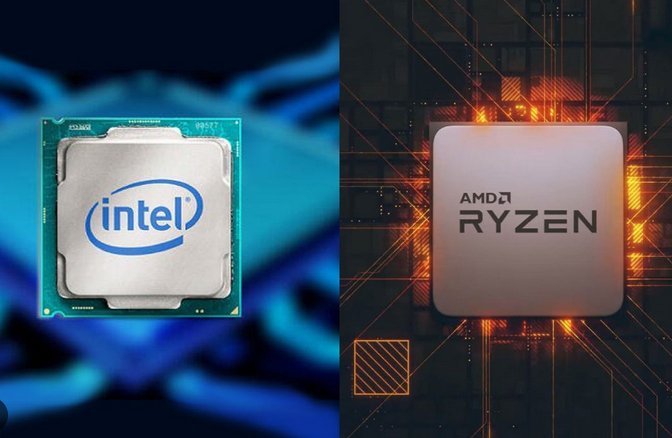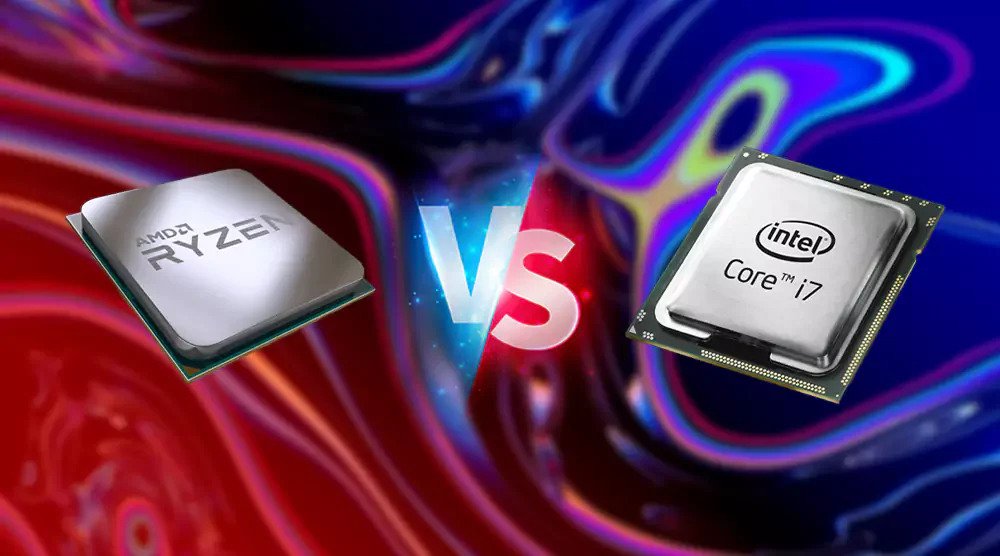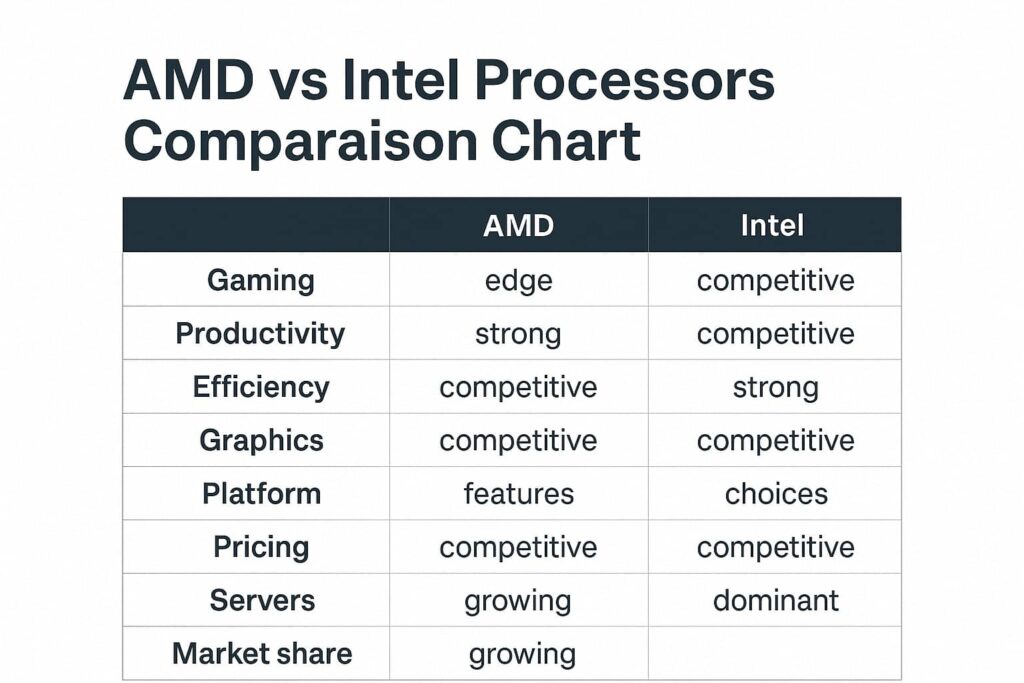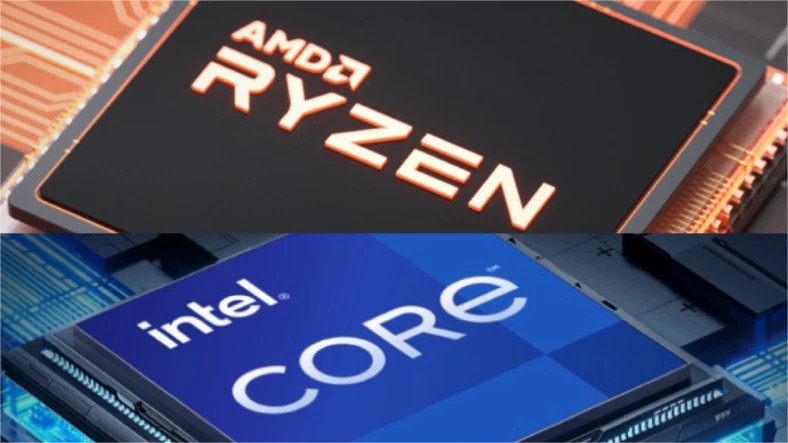When choosing between Intel and AMD processors, the decision can be tough. Both companies offer powerful chips with their strengths, whether you’re building a gaming rig, a work laptop, or a productivity powerhouse.
Intel processors are known for better performance per core, but AMD excels in multi-tasking and offers more value. While AMD can be up to 9% more powerful in some areas, Intel’s 13th-gen CPUs deliver great overall performance.
In this guide, we’ll explore the key differences to help you make the best choice for your needs.
Understanding Intel and AMD
1. History of Intel
Intel was founded in 1968 and quickly became a leader in computer processors. Over the years, Intel’s processors powered most of the world’s PCs, setting industry standards.
Known for its innovation, Intel introduced famous lines like Pentium and Core, which are still used today. While it has been the dominant player for many years, recent competition from AMD has pushed Intel to keep evolving its technology.

2. History of AMD
AMD started in 1969 and has always been a competitor to Intel. For a long time, it was seen as the “underdog,” but it found success with its Ryzen processors.
These chips changed the game with more cores and better value, giving Intel a run for its money. AMD now has a strong reputation, especially for users looking for better performance at a lower cost than Intel.
Key Differences Between Intel and AMD Processors
1. Performance in Single-Core vs. Multi-Core Tasks
Intel processors usually perform better in single-core tasks, making them a top choice for gaming. This means games run smoother with Intel’s high clock speeds.
However, AMD shines in multi-core tasks, like video editing or running many programs simultaneously. If you’re multitasking or doing heavy workloads, AMD’s processors are often more efficient with their extra cores.
2. Clock Speed and Overclocking
Clock speed is how fast a processor runs. Intel processors typically have higher clock speeds, which means they can complete tasks faster, especially in single-core performance.
AMD processors, however, have better overclocking potential. Overclocking is when you push your processor to run faster than its normal speed, which can help improve performance for both Intel and AMD chips when you need extra power for tasks.
3. Architecture and Manufacturing Process
Intel and AMD use different designs in their processors. Intel often uses a hybrid architecture, which mixes different types of cores for efficiency. AMD, however, uses a more traditional multi-core design.
Regarding manufacturing, AMD uses smaller, more efficient process technology (7nm and 5nm). While still competitive, Intel has faced challenges in shrinking its manufacturing process as quickly as AMD.
Also Read: What Are Data Processors? – A Clear Breakdown!
Gaming Performance
1. How Intel Performs in Gaming
Intel processors are often the go-to for gamers due to their strong single-core performance. This means games that rely heavily on single-core speed tend to run better on Intel chips.
Intel also delivers higher frame rates and smoother gameplay, making it a favorite among gaming enthusiasts.
2. How AMD Performs in Gaming
AMD has made significant improvements in gaming with its Ryzen processors. While Intel still holds an edge in some games, AMD offers great value for the price.
AMD’s Ryzen chips provide good performance, often at a lower cost, making them a solid choice for gamers on a budget.
3. Comparing Frame Rates and Stability
Intel processors generally offer higher frame rates in games, especially those that rely on single-core performance. However, the difference in frame rates is often small, and many gamers may not notice it.
Though slightly behind, AMD processors still provide stable and consistent performance, making them a reliable choice for gaming.
Productivity and Multitasking

1. Video Editing and 3D Rendering
For video editing and 3D rendering, AMD’s processors shine with more cores, handling demanding tasks efficiently. Intel also performs well but might not be as fast as AMD when rendering large projects or multitasking.
2. Coding and Development Workloads
Intel processors perform well in coding tasks, particularly for applications requiring high single-core speeds.
AMD also does well, especially with multi-core workloads. Developers often choose based on specific needs, with AMD being better for multitasking-heavy projects.
3. General Multitasking Capabilities
AMD’s multi-core processors excel in multitasking, allowing users to run many programs simultaneously without slowing down.
While excellent for single-core tasks, Intel processors are generally less efficient in handling heavy multitasking and may experience slower performance in such cases.
Read It: Socket 1366 Processors List – Models, Speed and Upgrades!
Price-to-Performance Ratio
1. Intel’s Pricing Strategy
Intel’s pricing strategy tends to be higher, especially for their premium processors. You’re paying for top-tier performance and advanced features, which makes their products less affordable for users on a tight budget.
2. AMD’s Value Proposition
AMD offers excellent value, especially for mid-range and budget users. Ryzen processors provide strong multi-core performance at a lower price than Intel, making them a top choice for those seeking good power without spending too much.
Power Consumption and Heat Output
1. Power Efficiency of Intel CPUs
Intel processors are built for power efficiency, especially with newer generations. While offering good performance, they balance power usage well.
However, they can consume more power and produce more heat during intense tasks compared to other options.
2. Thermal Performance of AMD CPUs
AMD processors are known for their excellent thermal performance. They tend to generate less heat, which means they are more power-efficient.
This allows for better cooling and reduces the need for additional cooling solutions during heavy usage.
Compatibility and Upgrade Paths

1. Motherboard and Chipset Support for Intel
Intel processors generally require new motherboards with each new series, making upgrades costly.
Although Intel’s chipset support is solid, this frequent need for motherboard changes can inconvenience those seeking a simpler upgrade path.
2. AMD’s AM4/AM5 Platforms
AMD’s AM4 and AM5 platforms offer long-term compatibility, allowing users to upgrade processors without replacing the motherboard.
This makes upgrading easier and more cost-effective because you don’t have to buy new components constantly.
Pros and Cons of Intel and AMD
1. Pros and Cons of Intel
Pros:
- Strong single-core performance, ideal for gaming.
- Excellent build quality and reliability.
- Great for high-performance applications and tasks.
- Leading-edge technologies, like Thunderbolt and integrated graphics.
Cons:
- Generally more expensive than AMD.
- Requires more frequent motherboard upgrades.
- Lower multi-core performance compared to AMD in some cases.
2. Pros and Cons of AMD
Pros:
- Great multi-core performance, perfect for multitasking and productivity.
- Better price-to-performance ratio, especially for budget users.
- More efficient power consumption and lower heat output.
- Long-term support for chipsets, making upgrades easier.
Cons:
- Slightly lower single-core performance in some games.
- It may not be as widely compatible with certain software or hardware.
- It can get less recognition in high-end markets than Intel.
AMD vs Intel Processors Comparison Chart

AMD processors deliver excellent multi-core performance, better value, and efficiency for creators, while Intel shines with strong single-core speeds, gaming edge, and stability.
The choice depends on your needs—AMD suits multitasking and budget, while Intel excels in high-performance gaming.
Must Know: Intel Xeon Gold Processors List: A Detailed Overview 2025!
Platform Features, Chipsets, And Upgrade Paths
A CPU is only as useful as the motherboard and platform. AMD’s AM4/AM5 era emphasized long compatibility (AM4 had multi-generation support), and AM5 currently supports features like PCIe 5.0 and DDR5; AMD tends to focus on a stable socket life with occasional firmware updates enabling new CPUs on older boards.
Intel’s recent generations sometimes require new sockets or different platform choices (chipset and BIOS support), and Intel’s move to new package types (including hybrid Compute Tiles in some Ultra families) has added complexity to upgrade paths.
Platform choice affects total cost — cheaper motherboards, mature BIOS support, and how long you can upgrade the CPU without swapping the board all matter.
If upgradeability matters to you, check the specific socket and chipset roadmap before buying.
How To Choose: A Buyer’s Decision Flow (Quick Checklist)
Use this checklist to translate the above into a purchase decision:
- Primary use — Gaming, streaming + gaming, content creation, pure productivity, or office tasks?
- Gaming → prioritize gaming benchmarks at your target resolution; consider AMD X3D if top-FPS matters.
- Content creation → prioritize core count and multi-threaded benchmarks (AMD or Intel HEDT/Threadripper/Workstation options).
- Budget — Compare retail prices for the exact CPU + motherboard combos, not MSRP. Promo seasons often change value.
- GPU pairing — With a low-end GPU the CPU matters more; with a top GPU, differences narrow. For 4K gaming, GPU dominates; for 1080p esports, CPU differences are magnified.
- Upgrade plans — Want to swap CPUs over time? Check socket longevity and BIOS upgrade policies.
- Power and cooling — Small cases/quiet rigs benefit from efficient chips or well-tuned Intel mobile designs; ensure your cooling matches rated TDP/MTP.
- Integrated GPU needed? → Choose APUs (AMD) or Intel mobile chips with Iris (Intel) based on light gaming or display needs.
- Platform extras — PCIe lanes, SATA, networking, and memory support matter for workstation builds. Compare chipsets beyond just CPU model.
AMD or Intel, Which Is Better for Laptop?
Both AMD and Intel offer great laptop processors, but it depends on your needs. Intel is known for better single-core performance, making it great for light tasks. AMD offers better multi-core performance and is ideal for multitasking and heavy workloads.
Is an Intel Processor Better Than AMD for Gaming?
Intel processors are often preferred for gaming due to their higher single-core performance, which improves frame rates in many games.
However, AMD’s Ryzen processors also perform well and offer great value, making them a strong competitor.
Which Is Better: AMD or Intel for Gaming?

Intel is often better for gaming because of its higher single-core performance, which boosts game speeds.
However, AMD’s Ryzen processors are catching up with strong multi-core support, offering good performance, especially for gamers on a budget.
Intel vs AMD 2025
By 2025, Intel and AMD will continue to compete in performance and innovation. Intel will focus on optimizing single-core performance and power efficiency, while AMD is expected to push multi-core performance, offering strong competition in gaming and productivity tasks.
Ryzen or Intel, Which Is Better for Laptop?
For laptops, Intel is often better for light tasks and has better battery life, thanks to its higher single-core speeds.
Ryzen processors are great for multitasking and offer better power efficiency, making them better for productivity and heavier tasks.
FAQs
1. Which one is better, AMD Ryzen or Intel Core?
AMD Ryzen offers better multi-core performance and value, while Intel Core is known for its higher single-core speeds, which are ideal for gaming.
2. Are AMD processors a better value than Intel processors?
Yes, AMD processors generally offer better value for the price, providing strong multi-core performance and efficiency at a lower cost.
3. Which company’s processors are better: AMD or Intel?
It depends on needs. Intel is great for gaming with single-core performance, while AMD excels in multi-core tasks and value.
4. Why do people still prefer Intel over AMD?
People prefer Intel for its reliability, strong single-core performance, and brand recognition, especially in gaming and high-performance tasks.
5. What are the disadvantages of Intel processors?
Intel processors are often more expensive, require frequent motherboard upgrades, and may not offer the same multi-core performance as AMD.
6. Which CPU is best for gaming?
Intel CPUs are generally better for gaming due to their higher single-core performance, which enhances frame rates in many games.
7. Why is AMD cheaper than Intel?
AMD processors are cheaper because they offer a better price-to-performance ratio, focusing on value without compromising performance.
Conclusion
In conclusion, Intel and AMD offer powerful processors with their strengths. Intel excels in single-core performance, making it ideal for gaming, while AMD shines in multi-core tasks and value for money. Choose based on your specific needs and budget.















